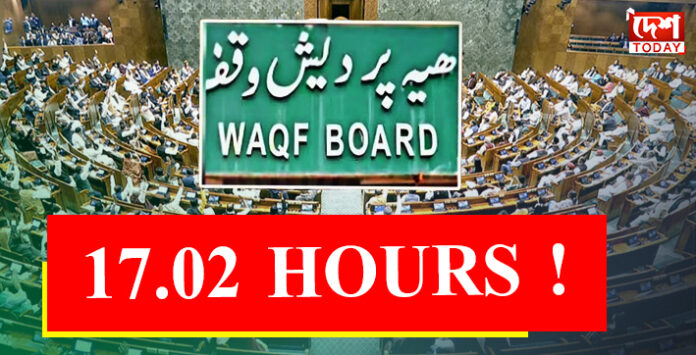After being passed in the Lok Sabha, the “Unified Waqf Management, Empowerment, Efficiency and Development Act” is now just a step away from becoming law, awaiting only its formal passage in the Rajya Sabha. Once the Narendra Modi government enacts the amended Waqf Bill into law, the Waqf Board—once mighty with vast lands since the British era—will essentially be reduced to a “paper tiger.” This board, which manages a significant portion of Islamic religious properties in India, has long been controversial. Across the country, a total of 40,951 cases are pending under various Waqf Tribunals, which clearly illustrates how ineffective or symbolic the Waqf Board has become.
The Waqf Board, a religious body with vast and disputed land holdings, has now seen its powers clipped primarily through the repeal of a key provision in the Waqf Act by the BJP-led Modi government. That controversial provision was Section 40 of the Waqf Act. The main objective of the government’s amendment proposal was the removal of this particular section. The issue of Section 40 came up repeatedly during discussions in both the Lok Sabha and the Rajya Sabha. Even opposition members admitted that if Section 40 were repealed, the Waqf Board would be reduced to a powerless puppet.
So, what exactly was in Section 40?
Section 40 of the Waqf Act gave the Board the authority to determine whether a property was Waqf or not. It stated that the Waqf Board alone could decide if a land or property belonged to it. Under Section 40(1), if any property was believed to be Waqf, the Board could collect information about it and declare it as such. The Board’s decision was deemed final. Section 40(2) further provided the Board with legal immunity—it said that unless reversed by a Waqf Tribunal, the Board’s decision would be binding, and neither the state nor central government could interfere or challenge it.
Section 40(1)(3) clarified that even if a property was not originally Waqf and was in the name of a trust or society, the Board could still claim it as Waqf property. Even if there was an inquiry, it generally tended to favor the Waqf Board. Section 40(1)(4) also reiterated that the Board’s decision would be final. This section has now been removed in the amended Bill.
It’s undeniable that the Modi government had the strength of numbers in both Houses. Using its majority, it forcefully passed the amended Waqf Bill first in the Lok Sabha and then in the Rajya Sabha. After 17 hours and 2 minutes of debate, the bill was passed in the Rajya Sabha at 4:02 AM on Friday, with 128 votes in favor and 95 against. This became a record for one of the longest debates on a single issue in Rajya Sabha history. The discussion began at 11 AM on Thursday and ended early Friday morning at 4:02 AM.
In the Lok Sabha too, after a long day-and-night debate, voting on the amended bill was extended twice, eventually taking place at midnight on Wednesday. Even though the opposition knew defeat was inevitable, they chose to vote instead of walking out. Initially, only 390 MPs voted due to confusion in the digital voting process—226 in favor and 136 against, with one MP registering as absent. Later, manual voting was conducted, where 288 MPs voted in favor and 232 against, comfortably passing the bill. A simple majority of 272 MPs was required, and the government had 280 in support. This included BJP’s 240 MPs, JD(U)’s 12, TDP’s 16, plus 5 from Chirag Paswan’s party and 7 from Shinde Sena—making the bill’s passage easy.
The bill was introduced in the Rajya Sabha on Thursday and was passed after a vote at 2:30 AM during the debate.
In the Rajya Sabha, the NDA had 125 MPs, with six seats vacant. So the support of 118 MPs was sufficient to pass the bill. The BJP had 98 MPs, JD(U) 4, Ajit Pawar’s NCP 3, TDP 2, plus 1 MP each from AGP and Tamil Manila Congress. Additionally, BJP claimed support from six nominated members.
From the very beginning, the opposition strongly opposed the amended Waqf Bill. The Modi government introduced it in the Lok Sabha on August 8, 2024. The opposition claimed it was unconstitutional and an infringement on Muslim religious freedoms, prompting the bill to be sent to a Joint Parliamentary Committee (JPC). Led by BJP MP Jagdambika Pal, the JPC held 38 meetings. Opposition members proposed 44 amendments, and the ruling party proposed 23. However, none of the opposition’s suggestions were included. The 14 amendments proposed by the ruling party members were incorporated, and the revised bill was approved by the central cabinet in December.
While drafting the “Unified Waqf Management, Empowerment, Efficiency and Development Act,” consultations were held with 250 stakeholders. The Waqf Board currently holds around 2.1 million acres of land and continues to expand by illegally occupying lands, often from poor families. After the Railways and the Defence Ministry, it is the third-largest landholder in India. Yet, it has failed to provide the government with proper documentation of its land holdings. Once enacted, the amended law will require the Waqf Board to submit a complete record of its properties to the district collector or equivalent authorities.

